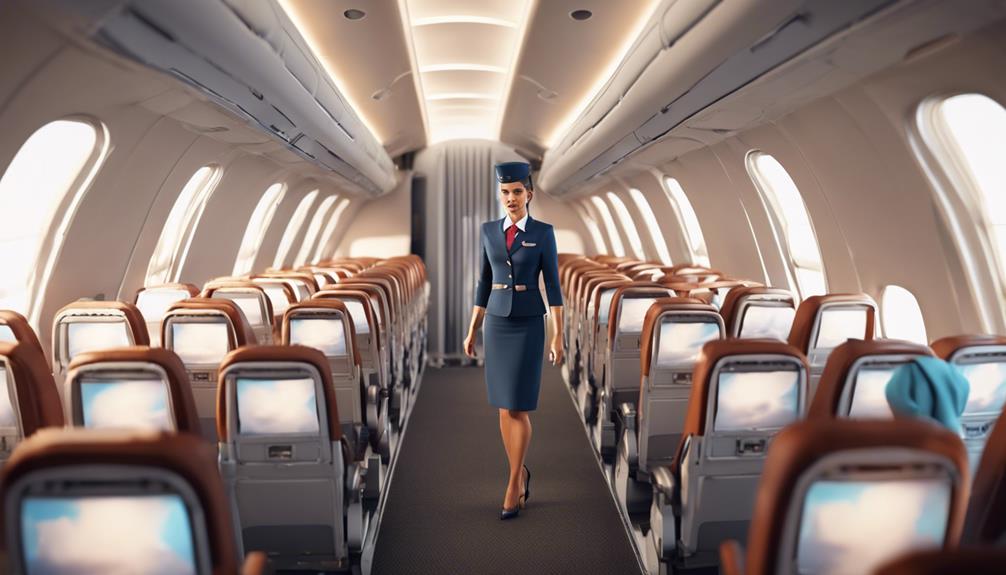Flight Attendant Job Description
Flight attendants play a vital role in passenger safety, comfort, and service excellence. Responsibilities include emergency response, customer care, and teamwork. Skills needed are communication, problem-solving, and cultural sensitivity. They undergo extensive safety training for emergencies, medical incidents, and evacuations. Cabin crew duties involve safety procedures, customer assistance, and enhancing the travel experience. Special needs assistance and comfort measures are provided for all passengers. They guarantee smooth service delivery, customer satisfaction, and prioritize passenger safety in various scenarios. A flight attendant's role is essential for a pleasant and secure flight experience.
Key Takeaways
- Ensure passenger safety and comfort during flights.
- Demonstrate effective communication and problem-solving skills.
- Manage emergencies like turbulence, medical incidents, and evacuations.
- Provide exceptional customer service and uphold in-flight service standards.
- Assist passengers with special needs and ensure a pleasant travel experience.
Key Responsibilities
In the dynamic role of a flight attendant, a primary responsibility is to guarantee the safety and comfort of passengers throughout the duration of the flight. This involves being well-versed in emergency protocols to handle any unexpected situations that may arise on board.
Flight attendants undergo rigorous training to make sure they can efficiently manage emergencies such as turbulence, medical incidents, or even more serious events like onboard fires or evacuations. Effective communication techniques are essential in such scenarios, as clear and concise instructions can help passengers remain calm and follow safety procedures accurately.
Flight attendants must be adept at relaying information to passengers in a reassuring manner while also coordinating with the flight crew to address any issues promptly. Additionally, communication skills come into play when assisting passengers with their needs, providing exceptional customer service, and fostering a positive and welcoming atmosphere onboard.
Mastering these emergency protocols and communication techniques is vital for flight attendants to fulfill their duty of ensuring a safe and pleasant travel experience for all passengers.
Required Skills
Possessing a diverse set of interpersonal and problem-solving skills is imperative for individuals aspiring to excel in the role of a flight attendant. Flight attendants are the face of the airline, responsible for guaranteeing the safety and comfort of passengers throughout the journey.
Here are four essential skills required to succeed in this dynamic role:
- Communication Skills: Flight attendants must possess excellent verbal communication skills to effectively relay safety instructions, provide exceptional customer service, and collaborate with the cabin crew. Clear and concise communication is critical in emergencies and during routine interactions with passengers.
- Problem-Solving Skills: Quick thinking and the ability to make sound decisions under pressure are essential for flight attendants. They must assess and resolve various issues that may arise during flights, such as medical emergencies, passenger conflicts, or unexpected turbulence.
- Cultural Sensitivity: Being culturally aware and respectful of diverse backgrounds is crucial for flight attendants to interact positively with passengers from around the world.
- Teamwork: Flight attendants work closely with the cabin crew to guarantee a smooth and safe flight. Strong teamwork skills are necessary to coordinate tasks, support colleagues, and maintain a harmonious working environment onboard.
Safety Procedures
Ensuring adherence to strict safety protocols is a vital aspect of the responsibilities undertaken by flight attendants during every flight. Flight attendants are extensively trained in emergency drills and evacuation procedures to handle any potential crisis onboard. These professionals play an essential role in maintaining the safety and security of passengers and crew members.
Emergency drills are conducted regularly to guarantee that flight attendants are well-prepared to handle various emergency scenarios, such as medical emergencies, onboard fires, or even more critical situations like a water landing. Flight attendants are trained to remain calm, assess the situation quickly, and take decisive actions to guarantee the safety of everyone onboard.
Evacuation procedures are meticulously planned and practiced to ensure a swift and organized evacuation in case of an emergency landing or evacuation. Flight attendants are responsible for guiding passengers to emergency exits, assisting with the operation of evacuation slides, and making sure that all individuals evacuate the aircraft safely and efficiently.
In essence, flight attendants are the first line of defense in guaranteeing the safety and well-being of everyone onboard, making their role in safety procedures indispensable.
Cabin Crew Duties
Cabin crew duties encompass a wide range of responsibilities that are essential for ensuring the safety and comfort of passengers throughout the flight.
From overseeing safety procedures to providing assistance to passengers in need, flight attendants play a pivotal role in maintaining a secure and pleasant travel experience.
Additionally, cabin crew members are also responsible for upholding in-flight service standards, catering to the needs of passengers and ensuring a high level of customer satisfaction.
Safety Procedures Overview
Demonstrating a thorough understanding of safety procedures is a fundamental aspect of the responsibilities carried out by cabin crew members in the aviation industry. To guarantee the safety of passengers and crew during flights, cabin crew are trained extensively in emergency procedures and safety protocols. Key aspects of safety procedures overview include:
- Emergency Evacuation: Cabin crew must be prepared to lead passengers to safety in the event of an emergency evacuation.
- Safety Demonstrations: Conducting pre-flight safety demonstrations to educate passengers on safety protocols and emergency procedures.
- Equipment Familiarization: Ensuring thorough knowledge of emergency equipment locations and operation.
- Crisis Management: Being equipped to handle various in-flight emergencies with calmness and efficiency.
Maintaining a high level of preparedness and vigilance is paramount in the execution of safety procedures by cabin crew members.
Passenger Assistance Guidelines
With a focus on enhancing passenger experience and ensuring their comfort and safety, cabin crew members are tasked with implementing Passenger Assistance Guidelines as part of their duties in the aviation industry. This involves being well-versed in emergency protocols to handle any unforeseen situations effectively.
Cabin crew also play an essential role in customer care, providing in-flight support to passengers while maintaining a high level of professionalism and attentiveness. Additionally, they are responsible for offering special assistance to individuals with specific needs, such as elderly passengers or unaccompanied minors.
In-Flight Service Standards
To uphold the standard of service excellence expected in the aviation industry, cabin crew members meticulously execute a range of in-flight duties that encompass the provision of exceptional passenger care and support. When it comes to in-flight service standards, attention to detail is paramount.
Here are four key aspects that cabin crew focus on:
- Meal Service: Ensuring timely and accurate meal delivery to passengers according to their preferences and dietary restrictions.
- Beverage Options: Offering a variety of beverage options to cater to different tastes and preferences.
- Presentation: Ensuring that meals and beverages are presented neatly and attractively to enhance the overall dining experience.
- Customer Assistance: Providing prompt and courteous assistance to passengers regarding meal service and beverage options.
Customer Interaction
In the domain of customer interaction, flight attendants play a pivotal role in providing passenger assistance and ensuring excellent service delivery.
From assisting with boarding and baggage to attending to in-flight requests and emergencies, flight attendants are at the forefront of passenger care.
Their ability to handle various passenger needs with professionalism and efficiency is essential in creating a positive and safe travel experience for all.
Passenger Assistance
Passenger assistance during flights is a critical aspect of a flight attendant's role, encompassing a range of customer interactions aimed at guaranteeing a safe and comfortable journey for all travelers. Flight attendants must be prepared to handle various situations effectively, including:
- Special Needs: Providing assistance to passengers with special requirements, such as unaccompanied minors or individuals with disabilities, making sure their needs are met throughout the flight.
- Medical Emergencies: Being trained to respond promptly and effectively to medical situations that may arise onboard, offering necessary aid and coordinating with medical professionals on the ground if needed.
- Comfort Measures: Offering comfort items like blankets, pillows, or additional assistance to passengers to enhance their in-flight experience.
- Emergency Procedures: Instructing passengers on safety protocols and assisting them during emergency situations to guarantee a calm and orderly response.
Service Delivery
Ensuring seamless service delivery is a cornerstone of a flight attendant's role, requiring adept customer interaction skills and a focus on enhancing the overall travel experience. Flight attendants play an essential role in maintaining customer satisfaction by providing service excellence throughout the flight.
They must engage with passengers professionally, catering to their needs with a friendly and accommodating demeanor. By actively listening to passengers, anticipating their requirements, and promptly addressing any concerns, flight attendants contribute immensely to the overall customer experience. Their ability to deliver service with a high level of quality and attention to detail directly impacts passenger satisfaction levels.
Through their interactions, flight attendants have the opportunity to elevate service standards and create a positive and memorable journey for all travelers.
Emergency Preparedness
With the imperative need for swift and effective responses during emergencies, flight attendants are meticulously trained in a variety of emergency preparedness procedures to ensure passenger safety and well-being. This training equips them with the necessary skills to handle various crisis situations that may arise during flights.
- Evacuation Procedures: Flight attendants are trained on how to efficiently evacuate passengers in case of an emergency, ensuring a quick and orderly evacuation process.
- Crisis Management: They are taught how to assess and manage crisis situations such as onboard medical emergencies, turbulence, or mechanical issues to maintain a calm and controlled environment.
- Emergency Drills: Regular emergency drills are conducted to practice responses to different scenarios, enhancing preparedness and coordination among the cabin crew.
- First Aid Training: Flight attendants receive thorough first aid training to provide immediate medical assistance to passengers in need until further help can be obtained.
Job Qualifications
Are flight attendants required to possess specific qualifications to perform their roles effectively and guarantee the safety of passengers onboard?
Indeed, flight attendants must meet various job qualifications to make sure they can handle the responsibilities onboard an aircraft. Training requirements are a fundamental aspect of a flight attendant's qualifications. They typically undergo extensive safety and emergency procedure training to handle situations that may arise during flights. Experience level also plays a critical role in a flight attendant's qualifications, with many airlines preferring candidates with prior customer service experience.
Language proficiency is another essential qualification for flight attendants, as they often need to communicate with passengers from diverse backgrounds. Being able to speak multiple languages can be a significant advantage in this role. Additionally, strong communication skills are crucial for flight attendants to effectively relay safety information, provide assistance, and handle any conflicts that may arise during the flight.
Conclusion
To sum up, the role of a flight attendant necessitates a diverse range of skills and responsibilities, from ensuring passenger safety to providing outstanding customer service. With a sharp attention to detail and thorough knowledge of safety procedures, flight attendants play an essential role in the airline industry.
By staying prepared for emergencies and effectively communicating with passengers, they create a secure and comfortable environment for all travelers. The theory that flight attendants are simply servers in the sky is debunked through their extensive training and critical role in aviation safety.







